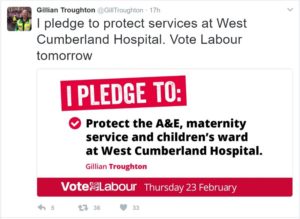News & Insights
Does politics damage consultation on health service changes?
Local. Politicians. Back. NHS. Changes.
They are five words you don’t often expect to see together. Bringing them together in a local newspaper headline would, in most areas, be an achievement of magical proportion.
But that’s the call the King’s Fund is making with the publication of it’s 58-page report on delivering English NHS sustainability and transformation plans. In the press release that accompanies its report, the health think tank’s chief executive, Chris Hamm, says:
I’m arguing they should too. From a different angle.
Hamm’s comment ignores a problem that we have to recognise. It’s a problem our politicians have to live with: supporting changes in local health services loses elections. (That’s if your party doesn’t deselect you as a candidate first.) So I don’t blame you if you’re thinking I might as well ask turkeys to support Christmas.
It’s easy to mutter terms like ‘political suicide’ and ‘third rail’ when we’re talking about MPs supporting changes to local hospital services. It’s easy because it’s proven to be true. Anyone who doubts that or needs reminding can listen to the excellent BBC Radio 4 Analysis programme Hospital Trust?, which talks to David Lock the former Labour MP for Wyre Forest who lost his seat to a local hospital campaigner in the 2001 general election over his support for proposed service changes at Kidderminster hospital. Lock had looked at the evidence and publicly supported the change proposals, because fewer of his constituents would die under the proposed arrangements and more would recover more quickly.
In an early trailer for our 2017 post-truth reality, that didn’t matter to local people who, Lock says, despite the evidence “genuinely believed there would be large scale deaths if the hospital changes went ahead. And they continued to believe that even after the changes were implemented in 1999.” Things got significantly better.
In the same programme Alan Milburn, who was the Secretary of State for Health at the time of Lock’s election defeat, says, “I wouldn’t have had his job for all the tea in China […] These things are really potent. I mean they are potent politically, they are potent for the community, they really matter.”
Milburn is right. Feelings run high. And there are significant advantages in tapping into that energy and riding the wave of a save-our-hospital campaign to election day. It’s tempting for candidates to paint a placard or make promises that sound like “if you elect me, our A&E/maternity unit/stroke centre will not close”.
We’ve seen those messages from MPs of all parties in the recent byelection campaigns in Copeland, where the vote is happening against the backdrop of a recent consultation on proposed changes to hospital services in the area:
These kind of promises are a deceit. They are misdirection deployed to gain an electoral advantage. The decision on the future of local hospital services is simply not the MP’s to make and it’s one over which they have little influence.
Politicians know local health leaders have to make administrative decisions about what services are provided where. They know all sorts of legal rules and policy means the flexibility those leaders have in making decisions is strictly limited, sometimes to the extent where there is very little choice.
The politician knows they are the ones best placed to influence the rules and policies that limit the choices local health system leaders can make. Whether it’s lobbying for more money, different staffing policies, or new medicines to be made available. Health bosses have to play the game by the rules. Our politicians can change the rules. They can even change the game.
But where’s the benefit for politicians in pointing that out?
The Telegraph reported King’s Fund chief executive, Chris Hamm, warning that politicians failing to support planned changes could leave patients at risk. Saying politicians who aren’t willing to support the plans are “essentially colluding in the continuation of unsafe services”.
That’s harsh, but I can see where he’s coming from.
The substantial service changes that are an inevitable product of the strategies set out in STPs will be the subject of public discussion and formal public consultation. MPs understand that public consultation is a form of participative democracy aimed at informing and influencing the decisions public bodies make. That knowledge gives them power and it offers them a way out of the corner their promises have painted them into.
It is evidence and information that make the difference in decisions informed by public consultation, not noise-level and weight of objections. The quality of information harvested from public dialogues in consultations on important issues would be much higher, and therefore the public’s influence in key decisions much greater, if the public understood the consultation process and how best to contribute. I’ve argued that consultors have an obligation to be clear on process, correct misunderstandings, and help campaign groups direct the efforts of their members and supporters so they can exert the greatest influence. Our politicians, particularly our MPs, have an important role to play in protecting the integrity of consultation processes, to encourage discussion, defend the space for debate, and making sure appointed decision makers have the information they need to fulfil their obligations..
Our cherished NHS needs to do what it has always done to remain relevant and serve us all: change, adapt, evolve.
The King’s Fund report calls for politicians to support health leaders in implementing essential changes. Even where they can’t support the proposals, politicians can answer that call by supporting quality public consultation dialogues and defending the integrity of a prescribed decision making process.
This article was originally published on Medium





